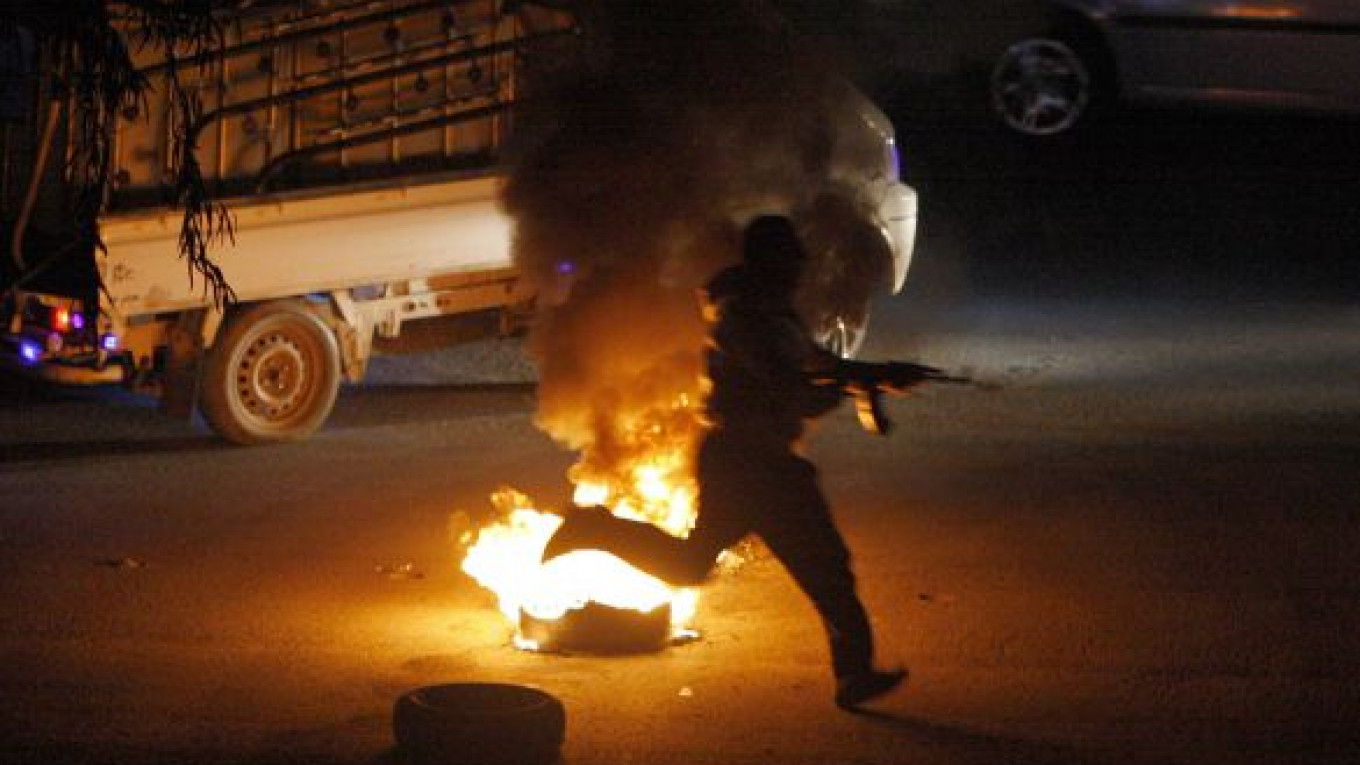Arms deliveries to Syria from 2007-11 were almost 600 percent greater than in the previous five years, and Russia supplied the bulk of the weapons, a leading think tank said Monday.
The report underlined Moscow’s continued willingness to arm Syria, in contrast to the arms embargoes other countries have imposed on Syrian President Bashar Assad.
The Stockholm International Peace Research Institute, or SIPRI, said Russia had supplied 78 percent of Syria’s weapons imports during the past five years, contributing to a 580 percent increase in the volume of arms imports by Syria.
“The transfer of arms to states affected by the Arab Spring has provoked public and parliamentary debate in a number of supplier states,” said Mark Bromley, senior researcher for the SIPRI Arms Transfers Program. “However, the impact of these debates on states’ arms export policies has, up to now, been limited.”
World powers have been unable to stop more than a year of bloodshed in Syria. Recent army gains against rebel positions have not succeeded in quelling the violence, and no negotiated settlement is in sight.
The humanitarian situation is likely get worse, the head of the International Committee of the Red Cross, or ICRC, said Monday, underlining the need for “urgent measures” to ease the effects of a year of bloodshed.
ICRC president Jakob Kellenberger came to Moscow to ask Russia’s help in persuading Assad’s government to allow more access for humanitarian aid to Syrians trapped in zones of fighting.
In a statement late Monday, Russia and the ICRC urged the Syrian government and its opponents to agree to daily humanitarian cease-fires.
Russia’s close ties with Syria make it one of the few countries left with any leverage over Assad. But Moscow is increasingly isolated in its support for his government. Syrian forces have killed more than 8,000 people in a year of violence, according to the United Nations.
“Our assessment, unfortunately, is that the humanitarian situation is most likely to deteriorate,” Kellenberger told Foreign Minister Sergei Lavrov at the start of talks.
Kellenberger said he wished to share the organization’s assessment and its “convictions about what are the most urgent measures to be taken in the humanitarian field.”
Moscow, with China, has shielded Assad by vetoing two UN Security Council resolutions condemning his government and has continued delivering arms to Syria under contracts, although it has expressed support for international humanitarian aid efforts.
In a rare show of unity with Western powers, Russia and China joined other Security Council members March 1 in expressing “deep disappointment” at Syria’s failure to allow UN humanitarian aid chief Valerie Amos to visit the country and said she should be allowed in immediately.
Amos has since been admitted to Syria but has called for unhindered access for humanitarian aid.
The ICRC and Syrian Arab Red Crescent have managed to reach some areas affected by the fighting, providing thousands of people with food, medicine and other essential items, but Kellenberger said much more access was needed.
“A daily cessation in the fighting for a period of at least two hours remains essential in order for emergency medical evacuations to take place safely and for aid to reach vulnerable people swiftly,” he said Sunday. “The ICRC is asking for an unambiguous commitment from all concerned to these breaks in the fighting.”
Syrian security forces clashed Monday with gunmen in an upscale neighborhood in Damascus that is home to embassies and senior officials.
It was one of the worst confrontations in the tightly controlled city center since the start of the uprising. At least three people were killed.
The clash deep in the Mazzeh district shows the shifting nature of the conflict and suggests that rebels might be trying to offset government morale gains from recent successful offensives against opposition strongholds by striking close to where senior regime members live.
Damascus has been largely free of the daily shootings and deaths reported across the country since the uprising against Assad began in March last year.
Armed rebels are active in Damascus’ suburbs and satellite towns but rarely venture into the heart of the capital where Assad’s troops are deployed in force.
The new fighting shows rebels can still strike in the capital despite successful government offensives in past weeks.
A Message from The Moscow Times:
Dear readers,
We are facing unprecedented challenges. Russia's Prosecutor General's Office has designated The Moscow Times as an "undesirable" organization, criminalizing our work and putting our staff at risk of prosecution. This follows our earlier unjust labeling as a "foreign agent."
These actions are direct attempts to silence independent journalism in Russia. The authorities claim our work "discredits the decisions of the Russian leadership." We see things differently: we strive to provide accurate, unbiased reporting on Russia.
We, the journalists of The Moscow Times, refuse to be silenced. But to continue our work, we need your help.
Your support, no matter how small, makes a world of difference. If you can, please support us monthly starting from just $2. It's quick to set up, and every contribution makes a significant impact.
By supporting The Moscow Times, you're defending open, independent journalism in the face of repression. Thank you for standing with us.
Remind me later.






